'The man who never knows when he is beaten deserved, on the day he played what will be his last World Cup game, mates who were not beaten in the mind before they were beaten on the field.'
Prem Panicker salutes 'India's best one day captain by a long margin who led superbly throughout the tournament.'
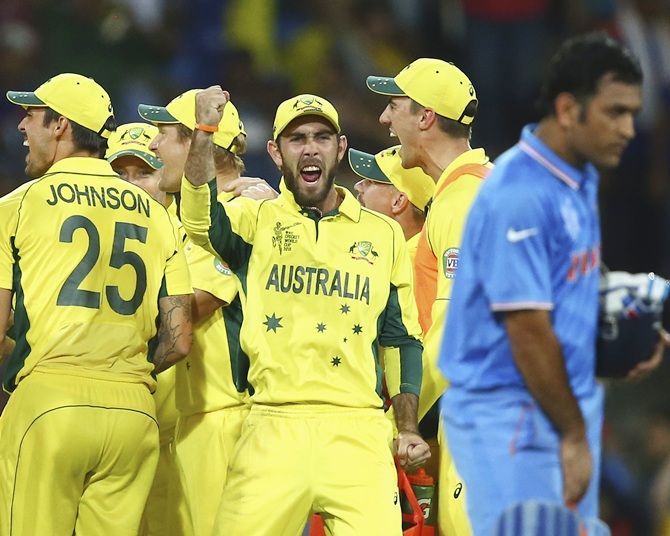
At the halfway mark of an ODI on March 12, 2006, the shell-shocked Proteas huddled in their dressing room at the Wanderers in Johannesburg.
Then coach Mickey Arthur tried to discuss 'plans' to calculate what his team needed to make in 20 overs, and 30, to make a go of it. But when you have been subjected to a Ricky Ponting-led assault of sustained ferocity and are chasing an unprecedented 434, what cohesive 'plan' could you possibly make?
Arthur in his autobiography recalls how, with one comment, Jacques Kallis relieved the tension and put the smiles back on South African faces and the wind back in their sails. 'Coach, I think the bowlers have done their job,' Kallis dead-panned, 'I reckon it's a 450 wicket, so they are 16 short of par.'
It is all about perception. Australia's 328/7 in the first innings today at the Sydney Cricket Ground is the highest target ever in a World Cup semifinal. Or, looked at differently, it was at least 22 runs under the 350-plus the Aussies seemed set for, when they completed the batting power play at 206/2 at the end of 35 overs, going at 12.8 during those five overs?
Perception led former England captain Nasser Hussain to suggest that India, with the 'weakest bowling' at the death of all international teams, was under the pump as the Australians approached the back end of their innings. You can see why -- the Indian line-up doesn't have the glamour boys of the fast bowling world -- the Wahab Riazs and Mitchell Starcs and Tim Southees and Trent Boults.
Hussain had to do a mea culpa -- once, when statistics for all ODI games since 2012 showed that India, with 7.6 runs conceded in the last ten overs on average, was the best of all teams; again, when the un-starry Indian attack kept the power-packed Australian batting to just 126 runs for the loss of five wickets in the final 15 overs (89 in the last ten) -- that phase when, during the entirety of this tournament, teams with wickets in hand have doubled the score or more.
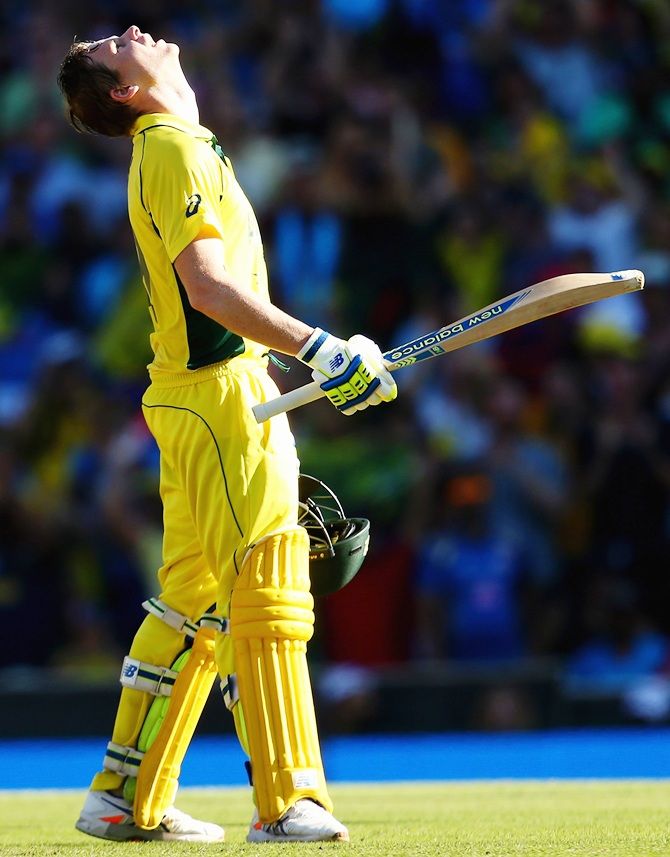
Perception, again, led former Australian captain Mark Taylor to remark, as Aaron Finch walked in the 39th over after mishooking an Umesh Yadav bouncer that got big on him, that the Aussie opener had 'done his job very well' -- the culmination of a cascade of admiring adjectives from various commentators in which the words 'grit' and 'determination' made frequent appearances.
What 'job' was that?
From the outset Finch hit the fielders, not the gaps, as he struggled with the fuller lines Umesh Yadav and Mohammed Shami bowled at the start with the short ball as surprise, not stock. Shami (5-0-16-0 in his first five overs) bowled 20 deliveries to him and 16 of them were not scored off -- an indication that not only were the boundaries not coming in the mandatory powerplay (56/1 at the end of 10), but the strike wasn't being turned over either.
At the end of 20 overs (Australia 105/1), Finch had managed 34 off 58 deliveries, with four fours -- that is, 16 with four strokes, 18 runs off the other 54. After 30, Finch was 59 off 94 with five fours -- that is, 20 off five, and 39 off the other 89.
Finch was fourth out, his time in the middle not helping him find the timing he was struggling for. With dot balls mounting, with his shots regularly finding the fielders in the ring, Finch (81 off 116 with 7 fours and one six, you do the math) tried to pull an Umesh Yadav short delivery that got big on him outside off, and picked out Shikhar Dhawan at midwicket.
In the middle overs, despite the efforts of Steve Smith batting in the form of his life, Australia went along at an average of 4.3 runs per over.
If you ignore the slow start as indicative of an opener playing himself in, then at what point does 'courage' and 'grit' and 'determination' begin to suck the oxygen out of the lungs of the innings?
Or looked at another way, is an innings valued for its own merits, or does the outcome -- an Australian win, in this instance, by the convincing margin of 96 runs to make Sunday's final against fellow hosts New Zealand -- change that valuation, inflate its worth?
Smith was both anchor and engine-room for the Australian innings, starting out with the straight-bat strokes through the V that are his trademark indices of form. At the end of 10, he had scored 30 off 26 balls faced with five fluid fours, all of them off Yadav.
Four of them came off Yadav's 5th over after the Indian quick, who on the day ramped his pace up to 150 kmph and bowled full lengths in his first four overs, tried out a profusion of short balls.
Smith crashed him between point and cover-point, dragged the next ball from outside off to midwicket, went across his stumps to pull another short one through square leg, and then did it again off the next ball. At this level of the game, any lapse from discipline comes at inordinate cost.
Smith continued to stroke the ball around the park with the effortless ease of a man totally at home in the pivotal number three position -- his elevation to that spot, at the expense of Shane Watson, being easily the one tweak that finally solved Australia's one-day puzzle.
Watching him bat, you would never think that his partner was dragging him back with his inability to up the scoring or even roll the strike over regularly; at the 30 over mark he had coasted to 80 off 79 while Finch was struggling at 59 off 94.
A century always seemed inevitable and it registered without fuss; with 15 overs to go even a double seemed probable. But with the innings well into its second half, Smith (105 off 93, 11 fours and two sixes) had to accelerate even further and for once, as Yadav put real effort into a short ball that grew big on the batsman, his hitherto assured hooking let him down, the ball hurrying him into a top edge to Rohit Sharma at deep square leg.
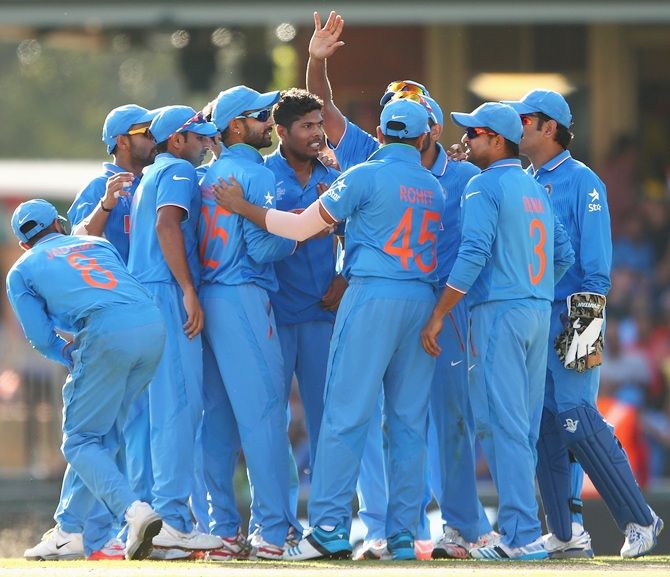
The Smith-Finch association yielded 182 runs off 186 balls, with Smith contributing 105 to Finch's 72, and provided backbone to the Australian innings. Glenn Maxwell walked in ahead of Michael Clarke to gain momentum, but after a brief flurry of controlled hits and top edges flying everywhere, M S Dhoni challenged him with Ravichandran Ashwin's off-spin.
The first ball was looped up above the eyeline and turned sharply in off an off-stump line forcing the defence; the next was bowled flatter on middle turning to leg, Maxwell (23 off 13 with three fours and a six) was drawn into his pet sweep, the pace on the ball forced the mishit and Ajinkya Rahane at deep backward square didn't need to move to take that.
Finch had to change gears and couldn't, failing to control a pull off Yadav and holing out to midwicket; Clarke had to explode from the start but couldn't, Mohit Sharma's nothing ball, short and bouncing waist high drawing the pull, the eagerness to put it away forcing the batsman to overhit to Rohit Sharma at midwicket.
James Faulkner (21 off 12) and Shane Watson (28 off 30) managed a measure of acceleration without ever landing the knock-out punch, and only a fierce Mitchell Johnson assault that peppered the long off and midwicket region with 27 off 9 (four fours, one six) pulled Australia to a challenging 328, 29 runs coming in the last two overs.
Perception, again, suggests that the Indian bowling, which has taken 70 wickets out of 70 leading into the semifinal, was not on par on the day. But consider the flatness of the track, the power-packed batting lineup of the hosts, and that impression could be altered somewhat.
The Indian bowlers were sharp at the start, went off the boil a bit as the innings headed towards the 30 over mark and blemished their hitherto spotless record, but came back well after the power-plays.
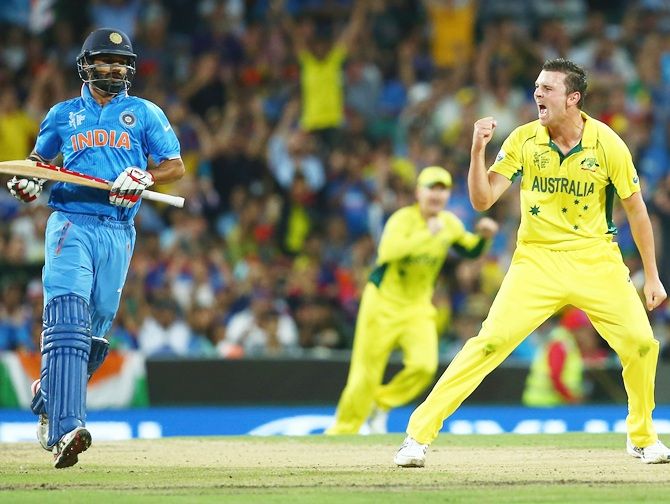
Ashwin, held back till the 18th over with Dhoni clearly waiting for the ball to soften to the extent possible, led the attack with sharp, attacking off spin bowling.
Teaming up with Jadeja in the middle overs, Ashwin kept Australia from breaking free, but perhaps the best bowling period was between the overs 38 and 42, shared between Ashwin, Yadav, Jadeja, Shami and Mohit Sharma -- 36 deliveries at the business end of the innings that cost 19 runs and the wickets of Maxwell, Finch and Clarke.
The bowlers were backed by extremely intelligent captaincy, Dhoni rotating his bowlers and manipulating his field placings to create fresh puzzles for the batsmen, and razor-sharp fielding particularly within the ring, where Jadeja yet again was the stand-out in a high class group.
In the Mickey Arthur autobiography referred to earlier, the then Proteas coach talks of how he tried to create a tactical plan to chase 434.
'Guys,' Arthur said, 'we need to be about 160 after 20 overs -- but we cannot afford to lose more than two wickets.'
At that point, says Arthur, 'I looked at Graeme Smith and Herschelle Gibbs, and try as they might, neither could restrain their laughter.' The other Proteas followed suit, the room reverberated with laughter.
So, Arthur recalls, he screwed up the paper with his calculations into a ball and flung it away. 'Ok, f**k it then,' he said, 'Just go and play, play your game, who the hell knows what might happen?'
329 is not 435 -- but it is a World Cup semifinal, and the weight of a game like that is worth runs in the bank. India's best hope was to play the ball, not the situation.
Australia had two proven bowlers in Josh Hazelwood and Mitchell Starc; in Mitchell Johnson they had a bowler who could turn up and be lethal, or not; and in Watson a slippy, muscular back up. The weak-points are Maxwell and Faulkner -- and in their spells would lie India's opportunity.
The opening overs of the Indian chase had everything. High drama, as Starc drew Rohit Sharma's edge with just the fourth ball of the over, Watson held at first slip but wasn't sure if it was clean, and the third umpire, Marais Erasmus, 'rocked and rolled' his way through replays and figured that the ball had been taken on the bounce. Rohit celebrated by threading the next ball through point with ridiculous ease.
The fourth over produced more drama. This time, Hazelwood banged one in and Dhawan pulled easily through midwicket off the front foot. The southpaw then skipped down the track to the next ball, drove on the up, got the edge and Brad Haddin dived to get both hands to it, but couldn't hang on.
Sharma looked tentative, Dhawan very sure of himself. When Johnson went around the wicket, the southpaw played a silken drive through the point region and in the next over, the 10th, he targeted the first of Australia's perceived weaknesses.
Faulkner was brought on; Dhawan picked the length outside off and banged a cover drive; extended his front foot to convert length into a half-volley off the next ball and drove through mid off; the ball after that was flat and full without any great pace and Dhawan played a pick up flick that eased the ball, with no apparent effort, deep into the stands behind midwicket.
That the assault on the relatively weak Faulkner had some planning behind it was apparent when, in the bowler's next over, Dhawan banged the first ball back down the track to the straight fence and, one ball later, skipped out of his crease, adjusted for length, and smashed a short-arm jab to the long on boundary.
Faulkner was to remedy his sullied reputation later, when he took out Ashwin and Sharma in successive deliveries of the 46th over to hammer superfluous nails into the Indian coffin.
Dhawan's wicket, in the 13th over, seemed against the run of both form and play. Josh Hazelwood pitched one up outside the left-hander's off stump, Dhawan blasted a lofted drive onto an off-side with just one fielder outside the ring -- Maxwell, sweeping behind the ring -- and picked him out to abruptly end a knock (45 off 41, six fours, one six) that had gotten the crowd right behind him, and raised visions of a real contest.
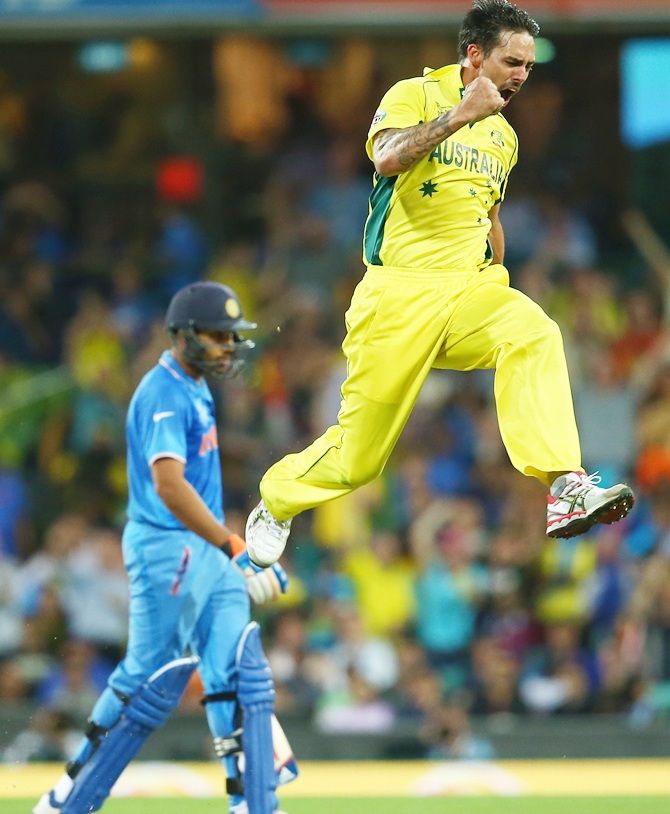
Against that, the wicket of Virat Kohli seemed inevitable from the moment he walked out and started searching outside his off-stump. That the Indian number three has a glaring weakness wide of off, around the sixth stump and beyond range, has become too apparent to too many bowlers around the world since his travails in England.
Clarke brought Johnson in to exploit the angle, and it took the left arm quick just seven deliveries to nail it.
Having tested Kohli outside off Johnson -- who always seems to bowl well if he's had a good time with the bat -- bounced one; Kohli (one run off 13 balls) tried a desperate pull and managed only to hit it straight up in the air for Haddin to amble over and hold where a short square leg would have been.
His innings at number three contrasted with that of his opposite number, Steve Smith; the knock lasted 13 minutes and failed to meet Kavya Trehan's MRF-sponsored requirement that he get to wherever she was in five minutes flat either.
Rohit Sharma's innings (34 off 48, one four, two sixes) oscillated between the bellicose and the becalmed; the opener's natural belligerence was on show when a pumped up Johnson bounced him and Rohit responded with a flat pull that powered the ball into the lap of a cheering group of Indian spectators in front of square leg.
Johnson responded with a dramatically altered length – a cross seam delivery at top speed and full length that nipped back to take the inner edge of Sharma's closed bat face and rattle the stumps.
Suresh Raina has many strengths, but resisting a bunch of amped up fast bowlers is not one of them. His tenure was remarkable only for a bizarre episode involving Starc in the 21st over. The fifth ball was full; Raina straight-batted it back down the wicket and stumbled out of his crease. Starc picked up on the follow through and flung at the stumps -- nothing wrong thus far.
The throw hit the batsman on the pad, though -- and Starc cut loose with an impassioned appeal, no one knows why. Raina's pad was definitely in front of the wicket, but you don't throw people out LBW.
Starc then added to the drama by going all 'Friends Romans and Countrymen' on Raina, treating the southpaw to an extended soliloquy and then an encore a ball later. All it earned Starc was a prolonged spell of booing from a crowd drenched in blue and a talking-to from umpire Kumar Dharmasena.
Faulkner replaced Starc for the next over, and Raina (7 off 11) whipped one off the stumps through midwicket to briefly resurrect memories of Dhawan. But to the very next ball, he hung his bat out outside off at a short ball and found the inevitable edge to Haddin behind the stumps. At 108/4 after 23 overs, the chase was effectively over.
Dhoni and Rahane settled down to rebuild, clearly not ready to believe the fat lady would sing just yet. The two, picking off singles and only occasionally bringing out the big hits, took India to 170/4 at the end of 35 -- a position that required them to score 159 in the remaining 15 overs.
The batting power play was taken, Dhoni took Faulkner (51 off 6 at the end of that over) for a four, but any illusion that the back end of the chase would amount to something ended when Starc came back in the 37th and produced a length ball at pace, and on the angle across the right hander.
Rahane hung his bat out, Haddin held, the Aussies reviewed the not-out decision and Erasmus saw the tiny spike on the snickometer that was enough for Dharmasena to overturn his initial verdict and send Rahane (44 off 68) on his way.
Dhoni was characteristically serene -- during his association with Rahane, the serenity of a man who knows he can perform miracles if he has an ally to stand with him; after Rahane's exit, the serenity of a man who knew it was all over but didn't want to throw it away anyway.
Or maybe he still believed. The television broadcasters drew attention to the startling statistic that before this innings Dhoni has been unbeaten 40 times when chasing and India had won 38 of those games, with just one defeat (the other was tied) as his sole failure.
196/5 after 40 (Australia 239/4 at that point), with 133 to get at 13.3 an over at the death, was an ask beyond the miraculous, though -- more so with five of those overs coming from Johnson and Starc.
Gratuitously, Steve Smith reminded everyone of his presence, getting into the game with a superb pick up and throw from backward point that found Jadeja way short of his ground on an attempted quick single.
India's run of seven wins on the bounce to get to the semis had several distinguishing factors. Two of those were that the bowlers never relieved pressure with gimme balls to spoil good overs, and the batting never failed as a unit, with one or the other of the top five putting up his hand to boss an innings.
In this game, both strengths broke down -- for all their penetration, the seamers in particular gave away a few too many gifts and in the chase, no batsman barring, briefly, Dhawan, showed either the nerve or the nous to bat long, and big.
The Aussie bowlers in contrast never gave anything away; the Dhawan blitz was more the result of a batsman in good touch. And Clarke's captaincy was admirable, noticeable chiefly in the fields he set for each individual batsman, and in how he gave his lesser bowlers the cover of one of the better ones at the other end, at all times.
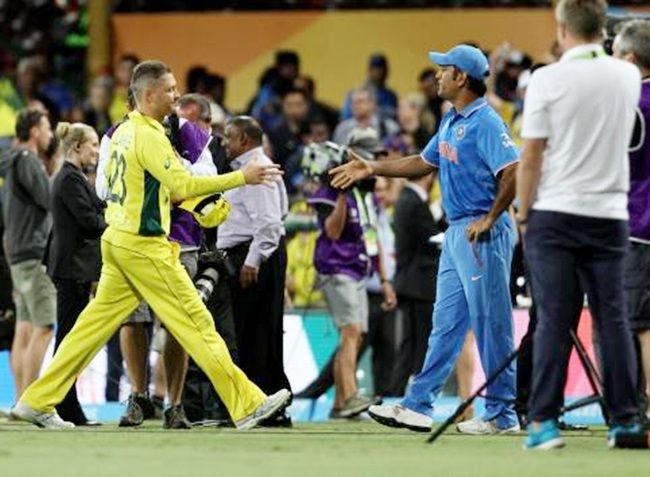
It was a big defeat that stopped short of being a disgrace because of some stellar passages with the ball in this game, and the accumulated memory of all that the team had achieved to get to this level.
At the end, you felt for Dhoni. India's best one day captain by a long margin led superbly throughout the tournament.
At the very end, he showcased his ice-cold nerve and impossible-to-describe batsmanship when, immediately after the Jadeja run out, he smacked Watson first into the stands deep behind cover and then straighter, over long off -- shots that, even with the cover of 109 off 46 balls behind them, produced some worried arm wavings and field adjustments from the Aussies before, some 14 balls later, a laser-guided throw from Maxwell at midwicket was too good for one of the best runners in the modern game.
The man who never knows when he is beaten deserved, on the day he played what will be his last World Cup game, mates who were not beaten in the mind before they were beaten on the field.
DON'T MISS PREM PANICKER ON THE WORLD CUP!
- Fortune's Fools Fail Again
- MS smiled, for the second time...
- The most searching examination of India's resilience with bat and ball yet
- Dhoni switched to Plan B: Take the pace off the ball and the oxygen out of the game
- A stutter no more, in a modest chase
- India sustain their internsity, to a point
- Wallflower in team of stars, Rahane claims his place under the sun
- When he could not walk with the gods, he was humble to be mortal












 © 2025
© 2025